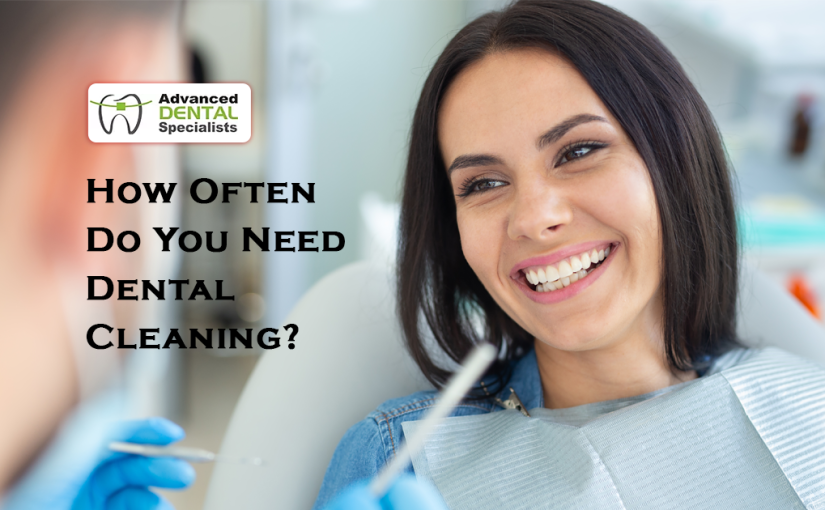Understanding the Importance of Regular Cleanings by Advanced Dental Specialists
Maintaining good oral hygiene is a cornerstone of overall health, and regular dental cleanings play a pivotal role in achieving this goal. At Advanced Dental Specialists, we believe that informed decisions about your oral health contribute to a lifetime of smiles. In this comprehensive guide, we’ll delve into the frequency of dental cleanings, why they are essential, and how they contribute to your overall well-being.
Understanding Dental Cleanings:
**1. The Basics of Dental Cleanings:
Dental cleanings, also known as prophylaxis, involve the removal of plaque, tartar, and stains from the surfaces of the teeth. Professional cleanings are typically performed by dental hygienists and are a crucial component of preventive dental care.
**2. Plaque and Tartar Formation:
Plaque is a soft, sticky film of bacteria that constantly forms on teeth. When plaque isn’t removed through regular brushing and flossing, it hardens into tartar (calculus), which can only be removed by a dental professional.
How Often Should You Get a Dental Cleaning?
**1. General Guidelines:
The American Dental Association (ADA) recommends that individuals, on average, should have a professional dental cleaning every six months. This frequency is suitable for most people with good oral health and a low risk of developing dental issues.
**2. Individualized Recommendations:
However, the optimal frequency of dental cleanings can vary based on individual factors. Some individuals may benefit from more frequent cleanings, while others may need them less frequently. Your dentist will assess your oral health, risk factors, and medical history to provide personalized recommendations.
**3. Factors Influencing Cleaning Frequency:
- Gum Health: Individuals with gum disease (gingivitis or periodontitis) often require more frequent cleanings to manage the condition and prevent its progression.
- Medical Conditions: Certain medical conditions, such as diabetes, may necessitate more frequent cleanings to mitigate oral health risks.
- Smoking and Tobacco Use: Tobacco use is a risk factor for gum disease and other oral health issues, warranting closer monitoring and possibly more frequent cleanings.
- Genetics: Some individuals may be genetically predisposed to plaque and tartar buildup, requiring more frequent cleanings.
Why Are Regular Dental Cleanings Important?
**1. Prevention of Cavities:
- Professional cleanings help remove plaque, the main culprit behind tooth decay. By preventing the buildup of plaque, cleanings contribute to cavity prevention.
**2. Gum Disease Prevention:
- Gingivitis and periodontitis, forms of gum disease, can lead to serious oral health issues. Regular cleanings are crucial in preventing and managing gum disease.
**3. Fresh Breath Assurance:
- Plaque buildup and the presence of bacteria in the mouth contribute to bad breath. Cleanings help keep your breath fresh by removing these odor-causing elements.
**4. Early Detection of Issues:
- Regular dental cleanings provide an opportunity for early detection of dental issues. Your dentist can identify signs of decay, gum disease, and other problems, allowing for timely intervention.
**5. Stain Removal and Aesthetics:
- Cleanings include polishing, which helps remove surface stains and contributes to a brighter, more aesthetically pleasing smile.
**6. Overall Health Connection:
- There’s a growing body of evidence linking oral health to overall health. Poor oral health has been associated with conditions like cardiovascular disease and diabetes. Regular cleanings contribute to overall health and well-being.
What Happens During a Dental Cleaning?
**1. Dental Examination:
- Before the cleaning, your dentist or hygienist will conduct a thorough examination of your oral health, checking for signs of issues such as cavities, gum disease, and oral cancer.
**2. Plaque and Tartar Removal:
- Using specialized tools, the hygienist will carefully remove plaque and tartar from the surfaces of your teeth, paying attention to hard-to-reach areas.
**3. Polishing:
- Polishing involves the use of a gritty paste and a rotating brush to remove surface stains and make your teeth shine.
**4. Flossing:
- Flossing is done to ensure that any remaining particles between your teeth are removed, contributing to a thorough clean.
**5. Fluoride Treatment (Optional):
- Depending on your oral health needs, your dentist may apply fluoride to strengthen your tooth enamel.
How to Make the Most of Your Dental Cleanings:
**1. Maintain a Consistent Oral Care Routine:
- Brush your teeth at least twice a day and floss daily to keep your teeth clean between dental visits.
**2. Communicate with Your Dentist:
- Share any changes in your health, medications, or concerns with your dentist. This information helps in tailoring your dental care.
**3. Follow Up on Recommendations:
- If your dentist recommends additional treatments or changes to your oral care routine, follow up promptly to ensure optimal oral health.
Regular dental cleanings are a cornerstone of preventive oral care, contributing to the longevity and vitality of your smile. At Advanced Dental Specialists, we are committed to providing personalized care that meets your unique oral health needs.
Remember, your oral health is an integral part of your overall well-being. By staying informed, maintaining a consistent oral care routine, and scheduling regular dental cleanings, you can enjoy a lifetime of smiles and optimal health. If you have any questions or would like to schedule your next dental cleaning, feel free to reach out. Your radiant smile is our priority, and we’re here to support you on your journey to excellent oral health.

